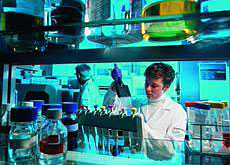
Cloud hangs over Basel’s chemical industry

The European chemical industry is facing stiff competition from Asian competitors, according to a study, which says high costs and over-regulation could cut Europe’s market share dramatically by 2015.
The study makes gloomy reading for workers in Switzerland’s chemicals capital, Basel.
The latest European Chemical Industry Council (CEFIC) report says that although the continent’s chemical and pharmaceutical companies may continue to thrive, large numbers of jobs are likely to be lost, as companies relocate operations to Asia to take advantage of lower production costs.
One scenario in the study predicts that European chemical production could drop by 0.6 per cent a year over the next decade. The world market share held by European products could fall from the 32 per cent of ten years ago to 16 per cent in 2015.
Another attraction of Asia is the less restrictive legal environment in which companies have to operate.
Low cost
“Many mass-produced, low-value-added products have already been moved to lower-cost countries,” said Rudolf Rechsteiner, a Social Democrat parliamentarian and Basel resident.
But restructuring is continuing apace in the chemical industry, and one priority is finding the optimum location in which to produce chemicals, which historically are to Basel what motor vehicles are to Turin.
Basel is home to six chemical and pharmaceutical companies which are active players in the world market: Novartis, Roche, Syngenta, Ciba, Clariant and Lonza. The city is a huge technological park.
Recently, one or two alarm bells have been ringing, despite the excellent financial results at giants like Novartis or Roche.
Cutting jobs
For instance, the Dutch DSM group is going to cut its 3,000-strong Basel workforce by a quarter; Ciba and Syngenta will be shedding about 200 jobs each.
Nor does Clariant rule out moving certain production lines away from Basel, in the context of a worldwide restructuring. They will be relocated to markets that are growing at a dizzying rate, like China.
Despite this general trend, Basel firms appear relatively calm.
“We make very specialised, high-value-added, top-of-the-range chemicals,” points out Johannes Randegger, a Novartis executive and Radical Party parliamentarian.
“What we do in Basel requires expertise and significant investment in technology, quality assurance and the protection of the environment. We comply perfectly with all these conditions, which would be difficult to export.”
Benefits
That view is largely shared by Rudolf Rechsteiner. Nor should other benefits of manufacturing in Switzerland be forgotten, such as political, economic and social stability, and the availability of state-of-the-art technology.
But one Swiss competitive advantage – the high-quality education system – is not quite as impressive as it used to be. Randegger says there is such a serious shortage of researchers in Switzerland that many companies in the sector have to hire them abroad.
Mixed blessing
For those countries which stand to benefit from any migration of production, there are other issues to consider, such as the implications for the environment.
That point was rammed home by the disastrous 1986 fire at the Sandoz chemical plant in Schweizerhalle, where more than 1,000 tons of chemicals leaked into the river Rhine. The toxins lingered for years, and were detected as far away as Rotterdam.
Since then, companies and authorities have become far more careful about the risks that the industry poses to the environment.
“Of course, pressure on the companies has increased,” notes Urs Vögeli of Switzerland’s Chemical and Biological Safety Control Centre (KCB).
“But we feel that the chemical industry continues to make every effort to minimize risks”.
swissinfo, Marzio Pescia
For the first time, the European Chemical Industry Council (CEFIC) has published a long-term perspective on the industry in Europe.
It says industry competitiveness in Europe is under threat, mainly from Asian countries, especially China, and from oil-producing countries in the Middle East.
The CEFIC criticised the often contradictory and uncoordinated legislation regulating the chemical and pharmaceutical sector in Europe.
Introducing a new product into the market in Europe is ten times more expensive than in the United States.
In 1990, the chemical and pharmaceutical sector employed about 40,000 people in the Basel region.
By the end of 2003, the number of jobs in the sector had dropped to about 27,500, of which 15,000 were in manufacturing.

In compliance with the JTI standards
More: SWI swissinfo.ch certified by the Journalism Trust Initiative
















![The four-metre-long painting "Sonntag der Bergbauern" [Sunday of the Mountain Farmers, 1923-24/26] had to be removed by a crane from the German Chancellery in Berlin for the exhibition in Bern.](https://www.swissinfo.ch/content/wp-content/uploads/sites/13/2025/12/01_Pressebild_KirchnerxKirchner.jpg?ver=a45b19f3)










You can find an overview of ongoing debates with our journalists here . Please join us!
If you want to start a conversation about a topic raised in this article or want to report factual errors, email us at english@swissinfo.ch.